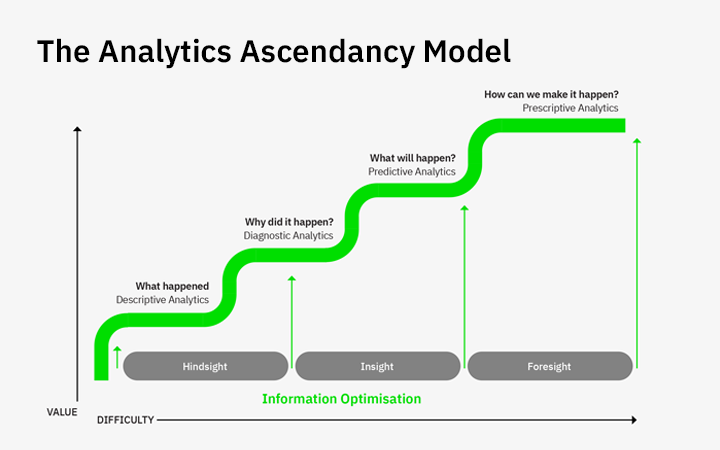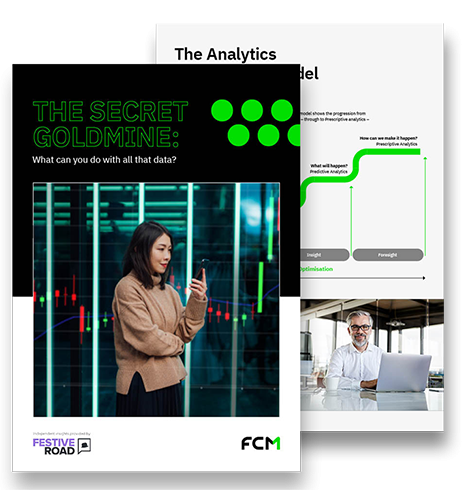Data makes the world go round
We asked FCM’s Chief Data Science Officer Stephen Pitcher about the evolution of data and what roles are beefing up a ‘data analytics team’ these days.
Data scientists, data engineers, data analysts, business intelligence developers, data support and report developers … these are just some of the roles forward-thinking companies are equipping themselves with to harness the power of data.
During the past 20 years, the rise of data in business as a powerful tool for decision making has been phenomenal. Talk to any experienced data analyst and they’ll provide plenty of examples of the way in which data is not only fuelling decision making across industries but also influencing corporate (and consumer) buying behaviour. The use of data nowadays, extends far beyond the remit of finance, marketing and human resource disciplines. Data analytics and data science is reshaping almost every sector from travel and streaming services to wildlife conservation and elite level sports.
Ask FCM’s US-based Chief Data Science Officer, Stephen Pitcher, about the upsurge in data analytics and he’ll tell you it’s the ‘way data is constantly evolving’ that makes this field of work extraordinary.
“If you look at the data analytics and data science used in professional basketball in America these days, the evolution of data is clearly evident,” Stephen said. “Twenty years ago, the NBA collected on average 2000 data points from any one basketball game. Now they collect 2 million data points from a single game. Inside the first three seconds of any game, their systems have already collected more data than they did in an entire 48-minute game 20 years ago.”
Stephen said a similar kind of evolution was taking place with the use of data in many industries including corporate travel. If you peek inside the hallways of any mid to large corporate around the world, you’ll find a growing tribe of data analysts … cleansing, transforming, orchestrating, manipulating, developing, cross-referencing and arranging data for all sorts of business-critical operations.
In fact, skilled data analysts are some of the most sought-after professionals in the world. And because the demand is so strong, and the supply of people who can do this job at an exceptional level is limited, data analysts command huge salaries, even at the entry-level.
Stephen said FCM's parent company Flight Centre Travel Group operates with two data analytics teams. One team handling internal data and the other client-facing.
“On the internal side of business analytics, we work with our global finance team … on the client side our teams are collecting data from across our network of 97 countries, building custom reports or dashboards for clients, helping clients to analyse their data and build their own data platforms so they can properly correlate it across their organisations,” he said.
A data analytics team can be made up of any number of data engineers, business intelligence developers, data analysts and data support members who fulfil specific roles such as project management and business analysis.
But what do all these people actually do with the data? And what kinds of roles fall under the travel data analytics umbrella? Here’s a quick snapshot -:

Data scientist: also known as a ‘data storyteller’. A data scientist works in the realm of Big Data. The work is geared towards providing meaningful information based on large amounts of complex data. Data science, or data-driven science, combines different fields of work in statistics and computation to interpret data for decision-making.
Referencing the FCM and Festive Road publication, The Secret Goldmine: what can you do with all that data?, Stephen said the work of a data scientist primarily sat at the prescriptive end of the Data Analytics Ascendancy Model. A data scientist helps companies to use their data to focus forward, preventing things from happening or predicting what kind of activity will help to maximise the opportunities for companies.
Business intelligence developers: these are the full-stack developers or jack-of-all-trades. A BI-developer focuses on developing and maintaining the technology infrastructure that supports the collection, processing and analysis of data. This may involve creating data models, building dashboards and designing ETL (extract, transform, load) processes.
Data engineers: these people are responsible for moving data between systems, transforming data, orchestrating and cleaning data.

Data support team: for FCTG this team of data specialists manage incoming internal or client facing data enquiries. They’re taking data extracts, giving clients access to systems and providing general data support.
Stephen said that for him, it was the speed at which the data analytics sector was moving in terms of playing such a critical role in decision making, that kept him coming back to the office each morning.
“We're not doing the same thing year in year out. Data work is constantly changing,” he said.
“We're collecting way more data than ever before and that makes the work far more interesting. The way a data machine works can be likened to the world of artificial intelligence (AI). The more data you collect, the more data you feed your engine and the smarter your data engine gets. Just like an AI platform, the more you information you feed an AI platform, the more intelligent the output is.”

Data in corporate travel
For the corporate travel sector, data provides the proof points companies need to make strategic program decisions … to save money, create process efficiencies or improve the traveller experience.
“Data analytics support and expertise in terms of educating clients on how to use their travel data is so in demand right now,” Stephen said. “More companies than ever are making critical decisions not just for their travel programs but across their businesses with the help of data.
“We’re seeing more clients coming to us today around travel policy modelling. They’re interested in looking at the ‘what if’ scenarios and for the future re-shaping of their travel policies.”
If you are yet to download FCM and Festive Road’s revolutionary data playbook - The Secret Goldmine: what can you do with all that data? You’re missing out on a key industry resource. Get your copy today!
Think your travel program could do with a data health check from one of our data or account management specialists? Contact us today or if you’re one of our valued clients, reach out to your dedicated FCM team.


